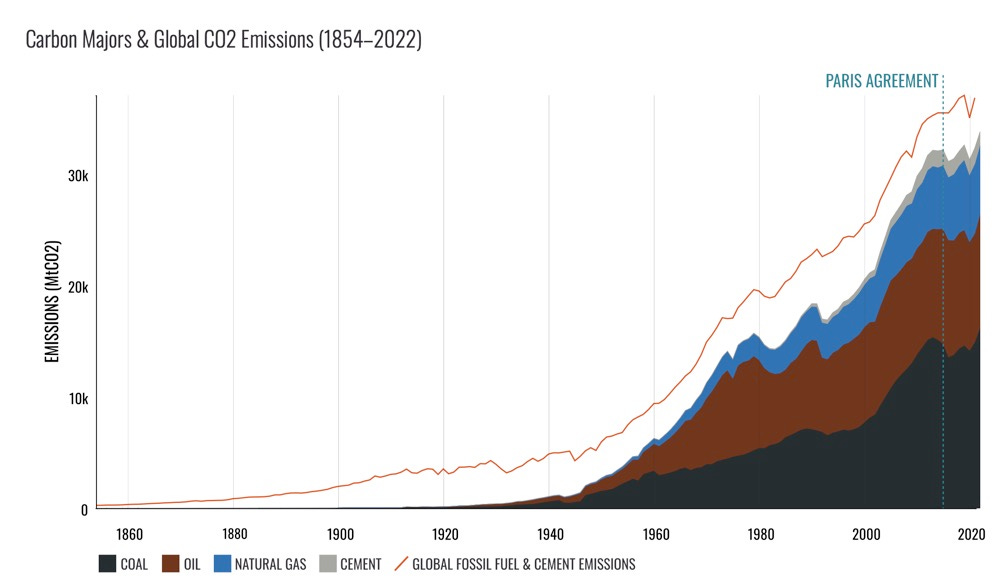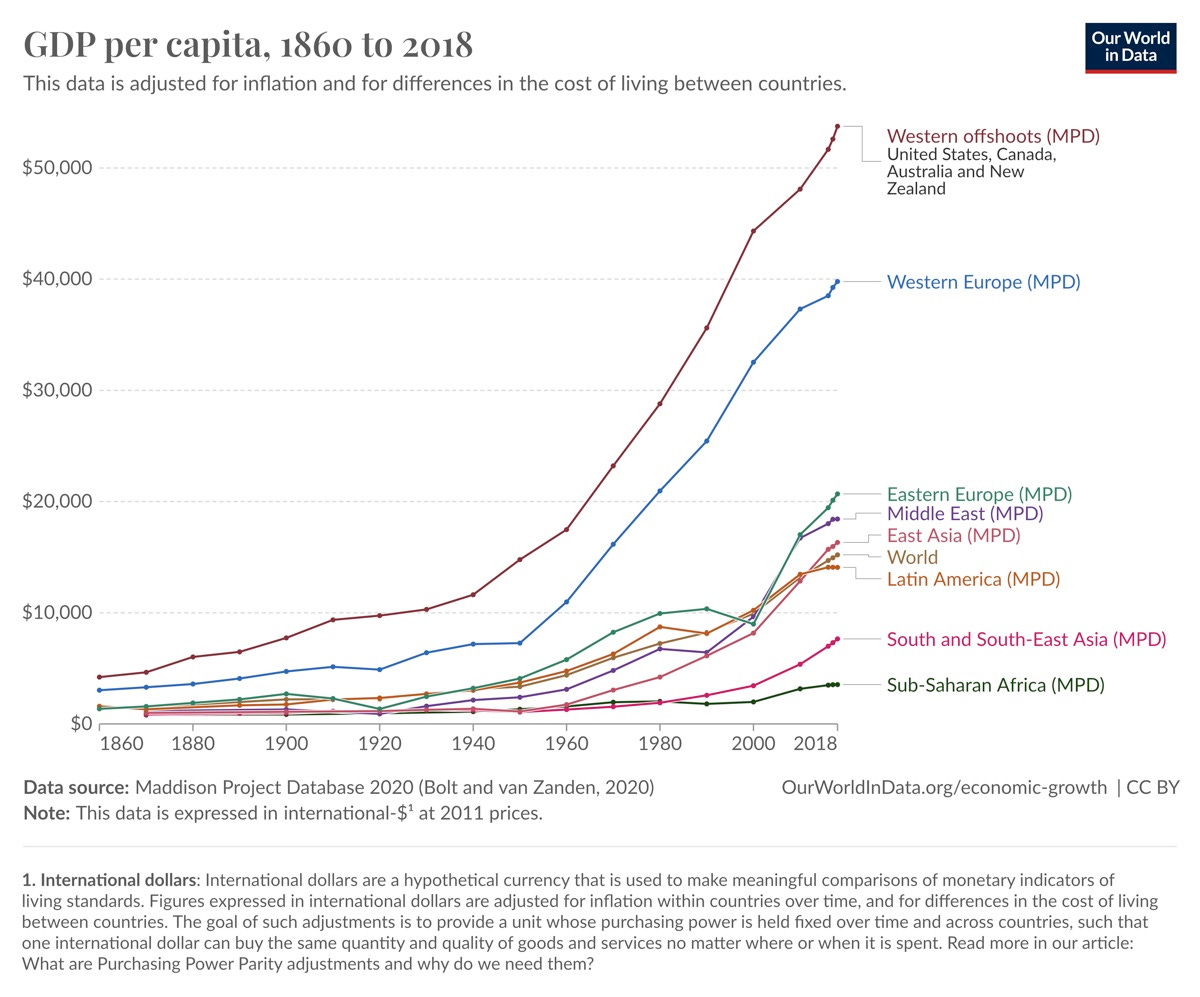Stop blaming 57 companies for greenhouse gas emissions and look in the mirror
It's us, not them. We have to stop buying what they are selling.
The Guardian headline screams, “Just 57 headlines linked to 80% of greenhouse gases since 2016.” It’s based on the latest Carbon Majors report, which has slightly different wording:
“80% of these global emissions from 2016 through 2022 can be traced to just 57 corporate and state producing entities. During this period, nation-state producers account for 38% of emissions in the database, while state-owned entities account for 37% and investor-owned companies for 25%.”
It is an important distinction: The Guardian headline says 57 companies, but companies only make up a quarter of the emissions.
The bulk of emissions come from burning fuels produced by nation-states and state-owned entities. Investor-owned companies account for a smaller proportion of emissions every year.
When you look at the list of those who have been creating all the emissions, there are no conventional corporations in the top ten emitters. Exxon-Mobil comes in at 11. Emissions from petroleum are dominated by Saudi Aramco, Gazprom, Iran, and other national entities that have no interest in listening to grumpy shareholders, protesters, or anyone else.
Note also the change in wording in the Guardian headlines since the last big Carbon Majors report; now they say the companies are “linked,” whereas before, the Guardian said they are “responsible.” This is an important difference because, as I wrote then, they are not responsible; we are. The last Carbon Majors report also made a big deal of listing the different scopes, noting that over 90% of the emissions were Scope 3, which is us buying the gas and burning it in our cars. The current report doesn’t mention scopes at all, which is a shame; they were rather convenient for my argument.
Tzepora Berman is quoted in the Carbon Majors press release about the latest report:
“The Carbon Majors research shows us exactly who is responsible for the lethal heat, extreme weather, and air pollution that is threatening lives and wreaking havoc on our oceans and forests. These companies have made billions of dollars in profits while denying the problem and delaying and obstructing climate policy. They are spending millions on advertising campaigns about being part of a sustainable solution, all the while continuing to invest in more fossil fuel extraction.”
Burning fossil fuels causes all these problems, but these companies and entities don’t burn fossil fuels; they produce and sell them. We buy and burn fossil fuels not because we like the stuff; we buy them because we own a car or a truck. We buy natural gas because we own a house with a furnace and a water heater. We indirectly buy coal because we want electricity and things made from steel, concrete, and aluminum. It’s the demand side, the consumption side, of the equation that matters. And we have built a world where we are always consuming more.
The producers get this and, as Berman notes, are doing everything they can to delay the transition. They want us to demand more. According to a Guardian article covering a recent industry gathering:
“We should abandon the fantasy of phasing out oil and gas, and instead invest in them adequately,” said Amin Nasser, chief executive of Saudi Aramco, the world’s largest oil company, to applause in the room…“In fact, in the real world, the current transition strategy is visibly failing on most fronts,” Nasser added, criticizing solar, wind and electric vehicles for what he said was a minimal impact in cutting greenhouse gas emissions.
We are never going to get these guys to do anything about the issue, and there is nothing we can do to stop them from pumping and selling as much as they can. The transition is failing because of the incredible wealth generated by the burning of fossil fuels, not just for the producers but for everyone. As Vaclav Smil wrote in Energy and Civilization:
By turning to these rich stores we have created societies that transform unprecedented amounts of energy. This transformation brought enormous advances in agricultural productivity and crop yields; it has resulted first in rapid industrialization and urbanization, in the expansion and acceleration of transportation, and in an even more impressive growth of our information and communication capabilities; and all of these developments have combined to produce long periods of high rates of economic growth that have created a great deal of real affluence, raised the average quality of life for most of the world’s population, and eventually produced new, high-energy service economies.
Fossil fuels and the things they make possible drive the economy. They are the economy. Most people like it that way; this is why politicians subsidize energy costs and why conservatives win when they promise to “axe the [carbon] tax.” It’s why, where I live in Ontario, Canada, the Conservative government freezes gas taxes and subsidizes electricity: cheap energy wins votes.
It’s the demand side, not the supply side. Economic growth creates more demand, and every politician and business person, indeed, pretty much everyone, wants growth.
There is a reason the economic growth curve doesn’t look much different from the CO2 emissions curve; they are intimately tied together. They feed each other. While sales of renewables, heat pumps, and electric vehicles are increasing, so are everything else, including emissions.
I am no fan of Exxon-Mobil or Shell, and I am not so crazy about Russia and Saudi Arabia, either. But I have trouble blaming them for, as Berman suggests, “the lethal heat, extreme weather, and air pollution that is threatening lives and wreaking havoc on our oceans and forests.” The problem is us, buying what they are selling. It’s the choices we make, the way we live, the things we buy, and the politicians we elect.
It’s us. We want cheap gas and cheap flights and want those 57 corporate and state-producing entities to pump more, not less. Climate be damned, we have F-150s to fill and international conferences to attend!











I believe that fossil producers and consumers are locked into a kind of codependency. Thus unlike most people who either primarily blame the producers as Berman does or the consumers as you do I see the need to focus on both supply and demand.
We should demonize the fossil fuel producers and we can still recognize that ultimately as you point out it is the incredible all but miraculous energy density of fossil fuels that makes their use so addictive and irresistible.
That’s why the clean energy transition will inevitably take decades and during these decades the world will increasingly suffer or unimaginable climate extremes.
Humanity was truly both incredibly blessed and cursed when fossil fuels were first discovered.
Can you agree and disagree simultaneously? It seems that I do. These entities are to blame, and we are to blame. We buy what they are selling, and they are using propaganda to sell more. "We have met the enemy and 'he' is us". The us in this case is everyone that uses fossil fuels, which includes the companies extracting them. The fossil footprint of extraction is a component of the problem. So are the militaries in a variety of countries, especially the US, used to protect our "right" to extract fossil fuels from other countries. Subdividing the blame is silly. It is a system, and most of us are trapped in that system and very few are making a legitimate effort to change that system. Governments, corporations, and consumers are all too blame. My main complaint about your approach is that it does not admit clearly there are players in this system actively working to prevent any systemic change and most of these are corporate who are buying their politicians.